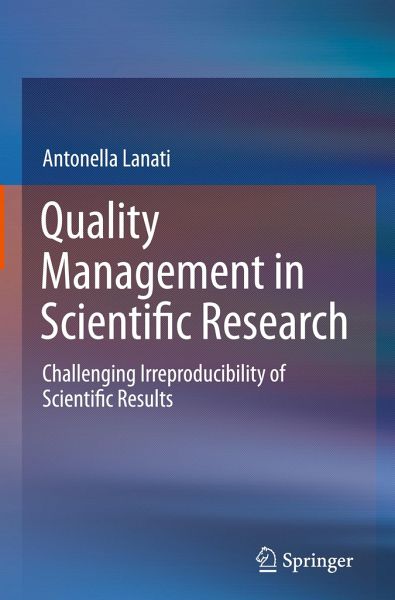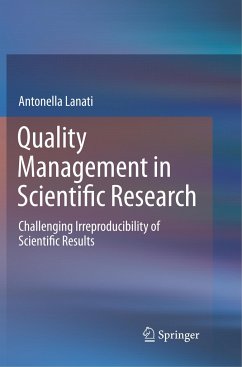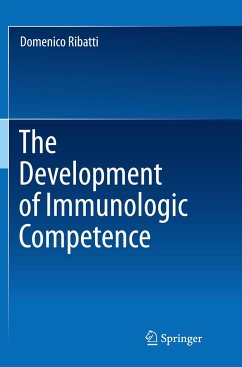
Quality Management in Scientific Research
Challenging Irreproducibility of Scientific Results
Versandkostenfrei!
Versandfertig in 6-10 Tagen
76,99 €
inkl. MwSt.
Weitere Ausgaben:

PAYBACK Punkte
38 °P sammeln!
In recent years, the attention of the scientific and social community has not solely been on producing new findings, but increasingly also on the related issues of the reliability, safety, and efficacy of the discoveries made, as well as the efficient and effective use of resources. The adoption of management models and tools can help scientists to improve their research, ensuring valuable, robust and dependable outcomes. Quality disciplines have been widely used for decades in industrial and business fields, building a knowledge base that can be translated and exploited, much to the advantage...
In recent years, the attention of the scientific and social community has not solely been on producing new findings, but increasingly also on the related issues of the reliability, safety, and efficacy of the discoveries made, as well as the efficient and effective use of resources. The adoption of management models and tools can help scientists to improve their research, ensuring valuable, robust and dependable outcomes. Quality disciplines have been widely used for decades in industrial and business fields, building a knowledge base that can be translated and exploited, much to the advantage of scientific research. However, quality references in scientific research are still extremely rare and largely limited to an international guideline and a few sector-specific standards. Despite WHO and EU Commission campaigns, there are still precious few practical texts that offer researchers guidance on quality principles and provide simple tools and methodologies for their daily work.
The book, starting from the problem of the reproducibility of scientific results and the substantial contribution that the Quality approach can make to research (Chapter 1), introduces the reader to key principles and basic concepts of Quality and illustrates both general and research-specific quality standards, paving the way for further discussion (Chapter 2). In turn, Chapter 3 presents detailed applications of Quality principles in various aspects of research, from study and ethics to materials and equipment management. Chapters 4 and 5, respectively, are devoted to Quality tools and Quality methodologies, as well as soft skills, all of which are valuable to scientific experimentation and study management. The concepts and practical tools discussed are extensively illustrated with examples from actual applications in scientific research.
The book, starting from the problem of the reproducibility of scientific results and the substantial contribution that the Quality approach can make to research (Chapter 1), introduces the reader to key principles and basic concepts of Quality and illustrates both general and research-specific quality standards, paving the way for further discussion (Chapter 2). In turn, Chapter 3 presents detailed applications of Quality principles in various aspects of research, from study and ethics to materials and equipment management. Chapters 4 and 5, respectively, are devoted to Quality tools and Quality methodologies, as well as soft skills, all of which are valuable to scientific experimentation and study management. The concepts and practical tools discussed are extensively illustrated with examples from actual applications in scientific research.












